人教版九年级全册Unit 8 It must belong to Carla-Section A (3a-4c)课件(共54张PPT,内嵌音频)
文档属性
| 名称 | 人教版九年级全册Unit 8 It must belong to Carla-Section A (3a-4c)课件(共54张PPT,内嵌音频) | 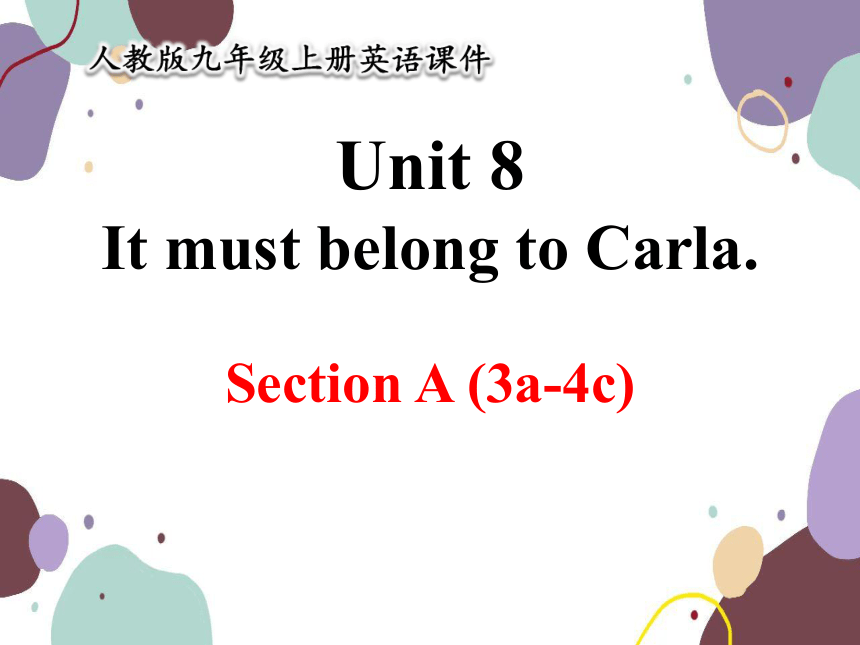 | |
| 格式 | pptx | ||
| 文件大小 | 18.8MB | ||
| 资源类型 | 教案 | ||
| 版本资源 | 人教新目标(Go for it)版 | ||
| 科目 | 英语 | ||
| 更新时间 | 2023-07-30 19:17:29 | ||
图片预览

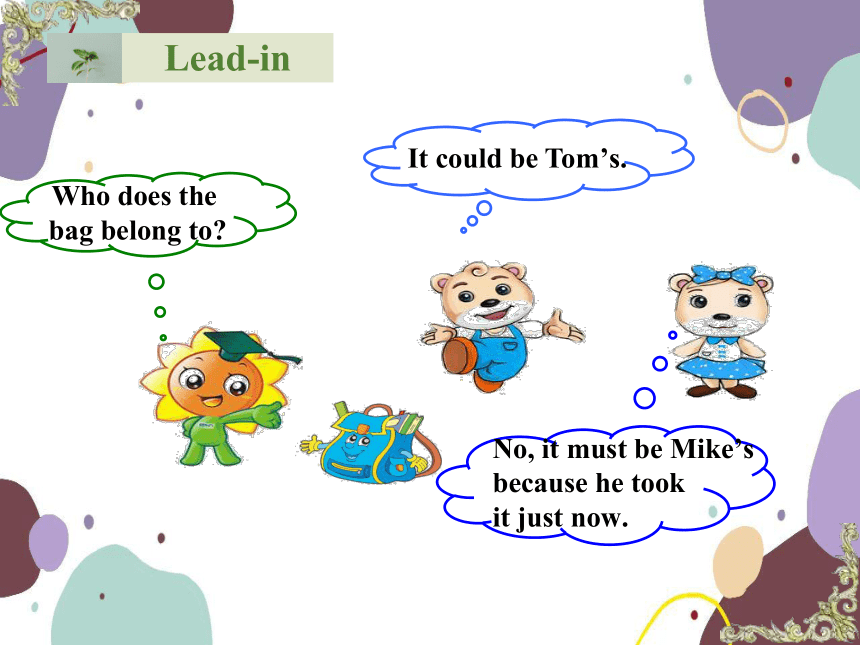
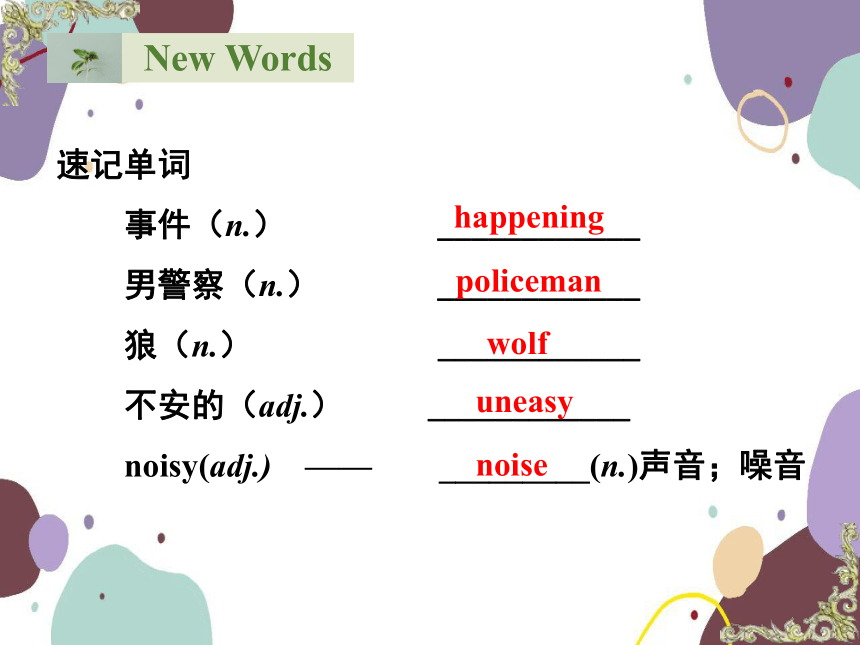
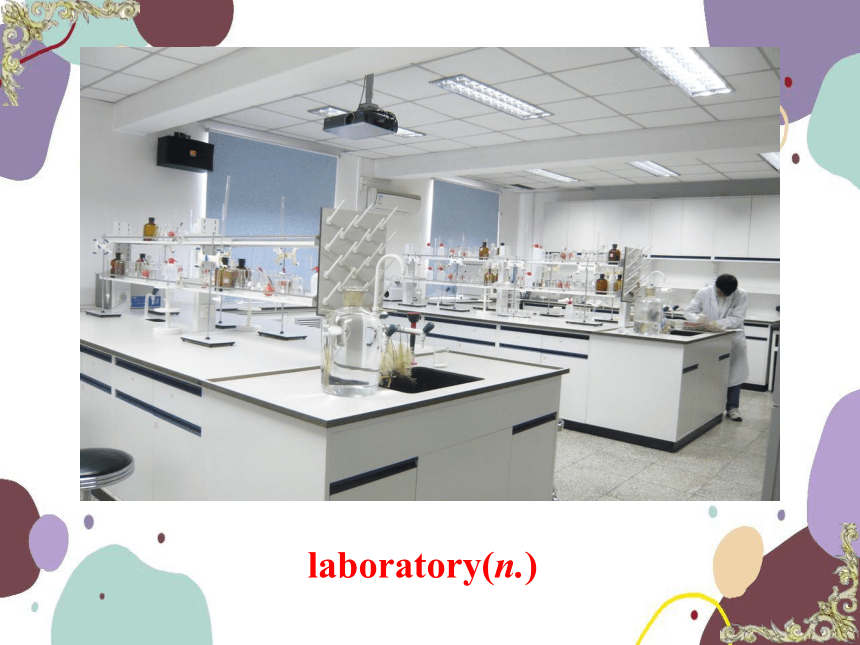


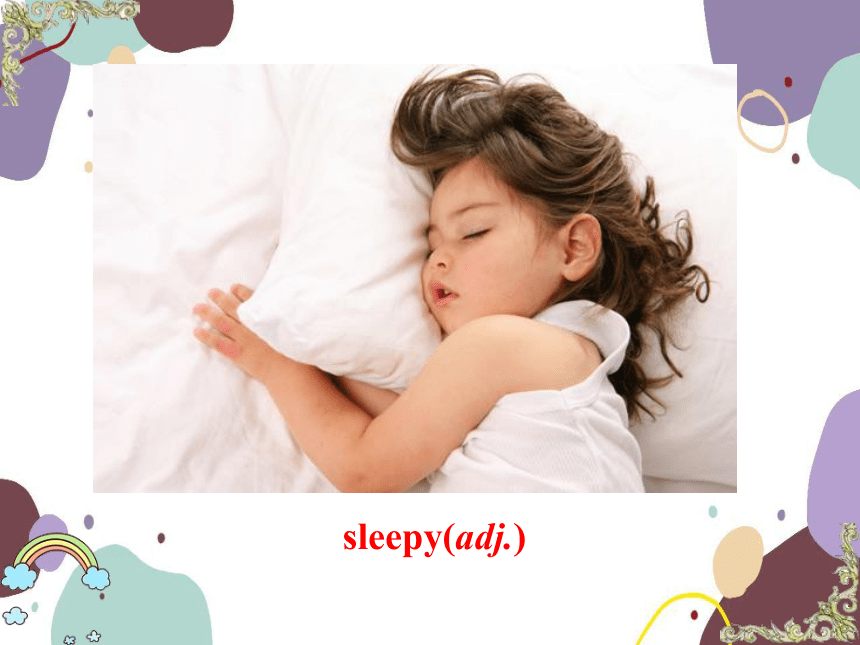
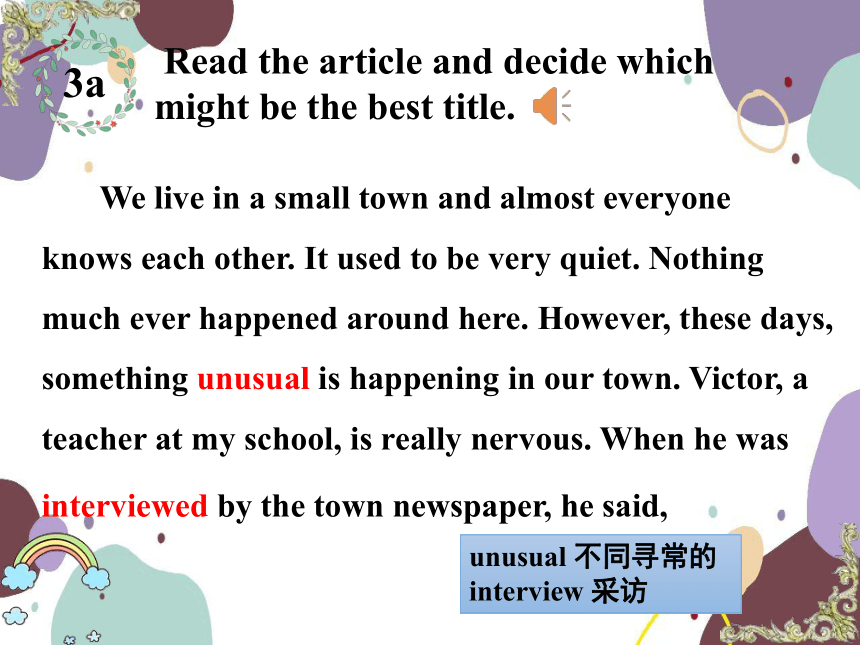
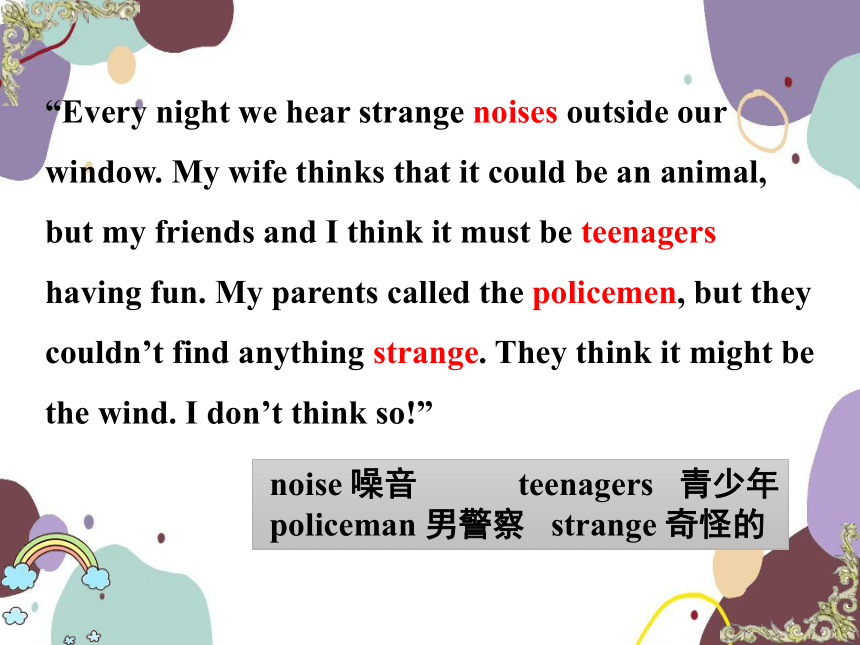
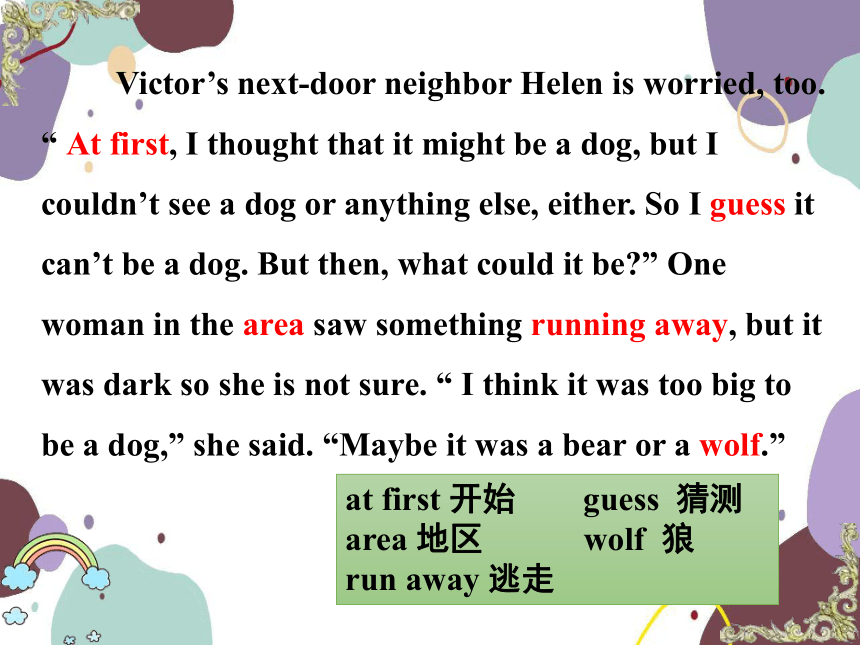
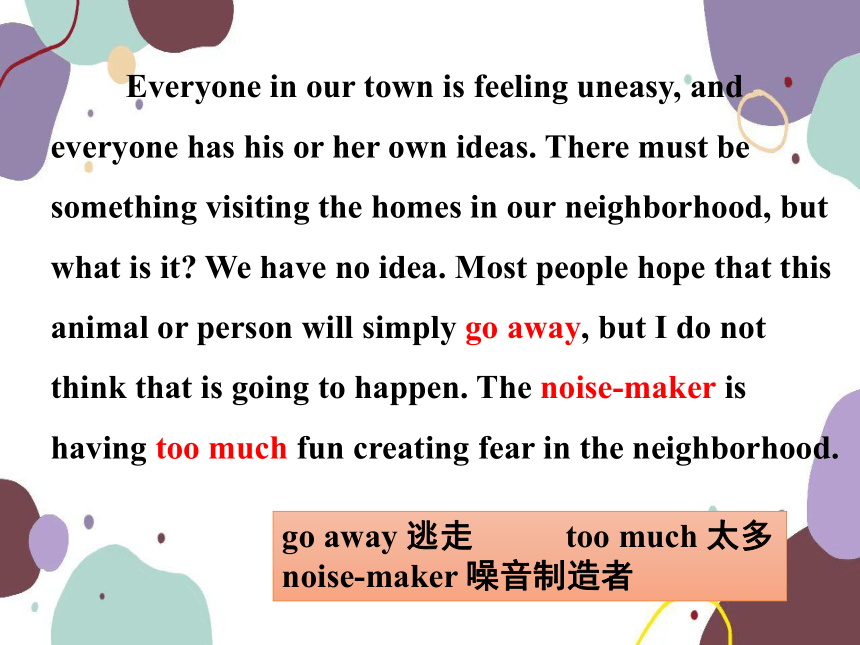
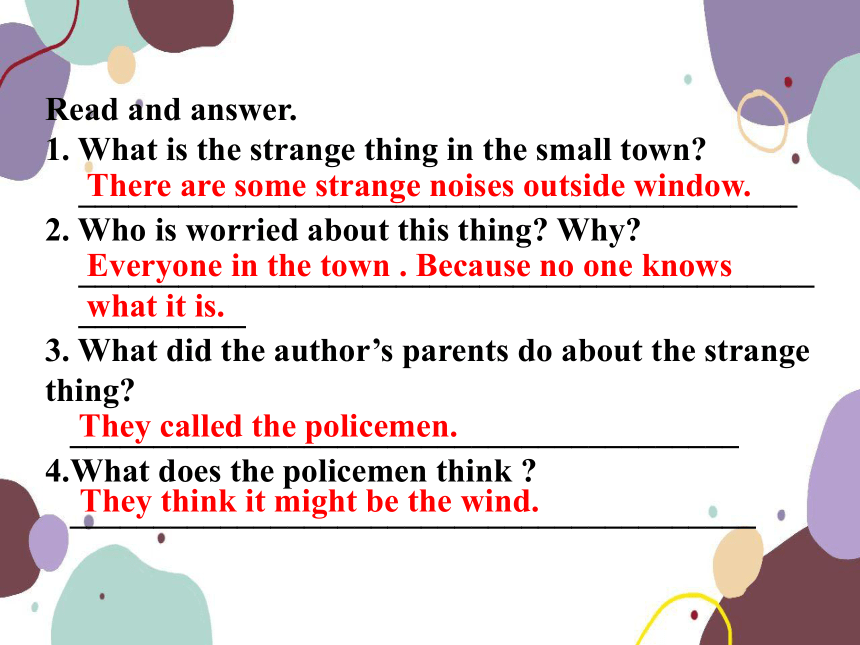
文档简介
(共54张PPT)
人教版九年级上册英语课件
Section A (3a-4c)
Unit 8
It must belong to Carla.
Lead-in
Who does the
bag belong to
It could be Tom’s.
No, it must be Mike’s
because he took
it just now.
New Words
速记单词
事件(n.) ____________
男警察(n.) ____________
狼(n.) ____________
不安的(adj.) ____________
noisy(adj.) —— _________(n.)声音;噪音
happening
policeman
wolf
uneasy
noise
laboratory(n.)
outdoors(adv.)
coat (n.)
sleepy(adj.)
3a
Read the article and decide which might be the best title.
We live in a small town and almost everyone knows each other. It used to be very quiet. Nothing much ever happened around here. However, these days, something unusual is happening in our town. Victor, a teacher at my school, is really nervous. When he was interviewed by the town newspaper, he said,
unusual 不同寻常的
interview 采访
“Every night we hear strange noises outside our window. My wife thinks that it could be an animal, but my friends and I think it must be teenagers having fun. My parents called the policemen, but they couldn’t find anything strange. They think it might be the wind. I don’t think so!”
noise 噪音 teenagers 青少年
policeman 男警察 strange 奇怪的
Victor’s next-door neighbor Helen is worried, too. “ At first, I thought that it might be a dog, but I couldn’t see a dog or anything else, either. So I guess it can’t be a dog. But then, what could it be ” One woman in the area saw something running away, but it was dark so she is not sure. “ I think it was too big to be a dog,” she said. “Maybe it was a bear or a wolf.”
at first 开始 guess 猜测 area 地区 wolf 狼 run away 逃走
Everyone in our town is feeling uneasy, and everyone has his or her own ideas. There must be something visiting the homes in our neighborhood, but what is it We have no idea. Most people hope that this animal or person will simply go away, but I do not think that is going to happen. The noise-maker is having too much fun creating fear in the neighborhood.
go away 逃走 too much 太多
noise-maker 噪音制造者
Read and answer.
1. What is the strange thing in the small town
___________________________________________
2. Who is worried about this thing Why
____________________________________________
__________
3. What did the author’s parents do about the strange thing
________________________________________
4.What does the policemen think
_________________________________________
There are some strange noises outside window.
Everyone in the town . Because no one knows what it is.
They called the policemen.
They think it might be the wind.
Read the last passage and then fill the blanks.
Everyone in our town is feeling _______, and everyone has his or her own _______ about the new thing visiting our homes, but we all have no idea on _____ _____ _____. When most people hope that this animal or person will ____ _____, I think the noise-maker is _______ _____ _____ ______creating fear in the neighborhood.
uneasy
ideas
what
is
it
go
away
having
too
much
fun
Which might be the best title
A. A Small and Quiet Town
B. Strange Happenings in My Town
C. Animals in Our Neighborhood
√
1.However, these days, something unusual is happening in our town.
然而,这些天在我们镇上正发生着一件非同寻常的事。
【词汇解读】
(1)however在句中作副词,表示语意的转折,意为 “然而;不过;但是”。
eg: Lily usually goes to school in her father’s car. However , she went to school by bus this morning.
莉莉通常坐她爸爸的车上学,但是今天早上她是 坐公共汽车去上学的。
Grammar
【辨析】
however
Grammar
(2)happen为不及物动词,意为“发生;碰巧”,指事情的发生带有一定的偶然性或不能预料。
eg: The accident happened three days ago.
三天前发生了这个事故。
Grammar
【拓展】
和happen有关的常用搭配:
sth. happen to sb.某人发生某事
sb. happen to do sth.某人碰巧做某事
【情景辨异】
eg:——What happened to you last night
昨晚你发生了什么?
——I happened to meet one of my friends in
the street.
在街上我碰见了我的一个朋友 。
Grammar
2. Every night we hear strange noises outside our window.
每天晚上我们都能听到窗外有奇怪的叫声。
【词汇解读】
noise是名词,意为“声音;噪音”。既可作可数名词又可作不可数名词。它的形容词是noisy。
eg: I heard a noise in the next room.
我听见隔壁房间有声音。
I don’t like so much noise.
我不喜欢这么吵闹。
Grammar
【妙辨异同】
noise 常指不悦耳的声音,如噪音、杂音、吵闹声等。
voice 指人发出的声音,如说话声、唱歌声等。
sound 泛指人们所能听到的自然界的一切声音。
Grammar
noise voice sound
【练一练】
There was a loud _________ outside the classroom. The physical teacher had to raise his_________ .“Light travels much faster than________. ”
noise
voice
sound
Grammar
3. My parents called the policemen, but they couldn’t find anything strange.
我父母报了警,但他们并没有发现任何异常。
【句型分析】
(1)call the policemen等同于call the police 意为“报警”,其中police是单数形式表示复数意义,用作主语时谓语动词用复数形式。
eg:The police are searching for a man with a beard.
Grammar
(2)anything strange意为“任何异常的”。形容词strange修饰不定代词anything。单个形容词作定语,一般放在名词的前面。但如果被修饰词是由 some-,any-,every-和no-构成的不定代词时,用作定语的形容词必须放在它所修饰的不定代词的后面。否定句和疑问句中一般用anything,而不用something。
eg:There is something new in his report.
Is there anything important
Grammar
4. At first, I thought it might be a dog , but I couldn’t see a dog or anything else, either.一开始,我以为可能是只狗,但我没看到狗,也没看到其他任何东西。
【词汇解读】
else是形容词,意为“别的;其他的”,用在疑问词或不定代词之后,也可在else之后加’s 构成所有格。
eg: What else can you do to help her
你还能做什么来帮助她?
This book must be somebody else’s .
这本书一定是别人的。
Grammar
【妙辨异同】
else :意为“其他的”,用于疑问词或不定代词之后。
other: 意为“其他的,另外的”,修饰名词,位于名词前。
eg : Where else did she go
她还去了别的什么地方
What other things can you see in the picture
你在图上还能看到别的什么东西
Grammar
5. The noise-maker is having too much fun creating fear in the neighborhood.
这个噪音制造者太乐于在社区里制造恐慌。
【短语剖析】
too much意思为“太多”,后面接不可数名词。
【辨析】
too much: 中心词是much,修饰不可数名词,意为“太多”。
much too: 中心词是too, 修饰形容词或副词,意为“太,非常”。
too many: 中心词是many,修饰可数名词,后接可数名词的复数形式,意为“太多”。
Grammar
Read the article again and find words to match the meanings.
nervous or worried _________________
area where people live _________________
young people __________________
animal like a very large dog ________________
person in the next house ________________
person who makes noise ________________
uneasy
neighborhood
teenagers
wolf
neighbor
noise-maker
3b
Read the article carefully and write what people think about the strange noises.
They think it must be teenagers having fun.
The policemen think it might be the wind.
3c
The writer himself thinks the noise-maker is having too much fun creating fear in the neighborhood.
One woman in the area thinks maybe it was a bear or a wolf.
Helen thinks it can’t be a dog.
Grammar Focus
Whose volleyball is this It must be Carla’s. She loves volleyball.
Whose hair band is this It could be Mei’s hair band . Or it might belong to Linda . They
both have long hair.
What did you see that night I’m not sure, but it can’t be a dog. It was bigger. I think it might be a bear or a wolf.
语法重点:情态动词表推测
定义
表示可能、怀疑、允诺、愿望、义务、必要、猜测等的动词就是情态动词。英语中表示推测的情态动词主要有 must,can,could,may,might等。
语法特征
1.情态动词不能表示正在发生或已经发生的事情,只表示期待或估计某事的发生。
2.情态动词除ought 和have 外,后面只能接不带to 的不定式。
3.情态动词没有人称、数的变化,即情态动词第三人称单数不加-s。
4.情态动词没有非谓语形式,即没有不定式、分词等形式。
can 可表示能力、允许、可能性、怀疑猜测,意为“可以,会,能”;can’t意为“不会,不能,不可以”,还有“不可能”之意。could为can的过去式,用法与can类似,常用于过去时态中;could还可用于现在时态中表示委婉客气,相当于can;could也可表示惊讶怀疑,不相信。can’t和couldn’t 一般用于否定句和疑问句中。
1.can
eg:He couldn’t be a thief.
2.may
may表示允许、也许,意为“也许;可能;可以”,语气不太可能。对may的一般问句的回答:
肯定回答一般是:Yes, please./ Certainly./ Sure等
否定回答一般是:Please don’t./No, you can’t/mustn’t.
might是may的过去式,与may用法类似,语气比may弱,表示推测的可能性更小,常用于肯定句和否定句中,不用于疑问句中。
3.must
must 表示必须要做的事,意为“必须,应该”。must一般问句的否定回答用needn’t或don’t have to , 而不用mustn’t, mustn’t意为“不可以,不能”,表示禁止,不许可。另外,must还可表示有把握的推测意为“一定、肯定”。must的过去式还是must。
在回答以must开头的一般疑问句时,否定式需用need not (needn’t),表示“不必”的意思。
eg:— Must we hand in our exercises today
— Yes, you must. ( No, you needn’t)
【活学活用】
(四川中考)——The lake is said to be dry. Is that true
—— It _______. Look, some kids are
swimming in it
A. must be true B. can’t be true
C. may not be true
B
(湖南中考)——Oh, it’s raining hard.
——Be careful! The road ______ be wet.
A. could B. must
C. might
(天津中考)——Where are you going this month
—— We ______ go to Xiamen, but we’re
not sure.
A. needn’t B. must
C. might D. mustn’t
B
C
Choose the best way to complete each sentence using the words in brackets.
1. A: Where’s Jean
B: I’m not sure. She ______________ (is / might be /must be) in the laboratory.
2. A: Everyone is going to the pool after school.
B: Really It _____________ (must be / can’t be /could be) hot outdoors.
might be
must be
4a
3. A: That’s the phone.
B: Hmm. I wonder who it ____________ (must
be / could be / should be).
4. A: I wonder if these are Jim’s glasses.
B: They ____________ (can’t be / might be /
could be) his. He doesn’t wear glasses.
5. A: I hear water running in the bathroom.
B: It _________________ (could be / must be /
can’t be) Carla. She was thinking of taking a
shower.
could be
can’t be
could be/must be
She was thinking of taking a shower.
她之前想洗澡。
【短语解析】
take a shower 意为“洗淋浴”,相当于 have a shower.
shower 是名词,意为“淋浴;淋浴器;阵雨”。
eg: John loves taking/having a hot shower after exercise.
约翰喜欢在运动后洗个热水澡。
Grammar
Complete these responses.
1. A: Many people are wearing coats.
B: The weather must be ________.
2. A: Sally has been coughing a lot.
B: She might be _______________.
3. A: This restaurant is always very crowded.
B: The food ________________.
4. A: Whenever I try to read this book, I feel sleepy.
B: It can’t ___________________.
cold
having a cold
must be good
be interesting
4b
Whenever I try to read this book, I feel sleepy.
每当我试图读这本书时,我都感觉到困倦。
【词汇解剖】
本句是whenever 引导的时间状语从句。
sleepy 是形容词,意为“困倦的;瞌睡的”。
Grammar
【妙辨异同】
sleepy是形容词,意为“困倦的;瞌睡的”。即可作定语。也可作表语。
asleep是形容词,意为“睡着的”,只能作表语,不能作定语。fall asleep 意为“入睡”。
Grammar
Look at this picture of a room. How much can you tell about the person who lives here Is it a boy or a girl What are his / her hobbies Discuss your ideas with a partner.
4c
A: It could be a girl’s room because
it’s very tidy.
B: I guess so . But it might be a boy’s
room because the clothes look like
boys’ clothes.
It could be a girl’s room because it’s very tidy.
I guess so . But it might be a boy’s room because the clothes look like boys’ clothes.
Discuss
1. Luckily, I ______________ (interview) by the
__________ (interview), a very old woman yesterday.
2. 同义句转换:
—My parents called the policemen, but they couldn’t
find anything strange.
—My parents called the policemen, but they ________
find _________strange.
3. There is someone_________(knock) at the door.
interviewer
could
knocking
was interviewed
nothing
Exercise
Ⅱ.单项选择。
1.——Why are you so tired these days
——Well, I have _______ work to do.
A. too much B. too many
C. much too D. many too
2. —— _____ _____this balloon
—— It’s Amy’s.
A. Who ; is B. Whose ; are
C. Whose; is D. Who ; are
Exercise
C
A
3. ——Look ! A book is on the floor . Whose is it
——It _____be Rick’s . It has his name on it.
A. mustn’t B. can’t
C. must D. need
4. —— Is Lisa at home
—— I’m not sure . She _____ be on the way home.
A. can’t B. could
C. should D. need
5. There is not ________ unusual in class.
A. something B. anything
C. some D. some thing
Exercise
C
B
B
6. I began watching here an hour ago, but now nothing ______ yet.
A. happened B. will happen C. has happened
7.An official ______ by some reporters on food problems in Shanghai yesterday.
A. is interviewing B. is interviewed
C. was interviewed
Exercise
C
B
8.—Tom, ________ is ready.
—I don’t want to eat____________ ,Mum. I’m not
feeling well.
A. something nice , anything
B. nice something, anything
C. something nice , nothing
9. It is too _____ for us to sleep in the room.
A. noise B. noises C. noisy
Exercise
C
A
Ⅲ.用适当的情态动词填空。
1.—— Susan has bought a large house with a swimming pool.
—— It ________ be very expensive. I never even dream about it.
2.——Listen! Is Mr. Green giving a report in the hall
—— No, it _______ be him. He has gone to Japan.
3. Ann hasn’t come to school today . I think she ___________be ill.
4. The guitar _______ belong to Alice . She likes playing the guitar.
5.—— I wonder if this is Jack’s book.
—— It ______ be his . It has Linda’s name on it.
must
can’t
may/might/could
can’t
may/might/
could
Exercise
书面作业 (Writing work)
(1)默写所学的新单词
(2) 完成学生用书的相关作业
Homework
谢谢观看
人教版九年级上册英语课件
Section A (3a-4c)
Unit 8
It must belong to Carla.
Lead-in
Who does the
bag belong to
It could be Tom’s.
No, it must be Mike’s
because he took
it just now.
New Words
速记单词
事件(n.) ____________
男警察(n.) ____________
狼(n.) ____________
不安的(adj.) ____________
noisy(adj.) —— _________(n.)声音;噪音
happening
policeman
wolf
uneasy
noise
laboratory(n.)
outdoors(adv.)
coat (n.)
sleepy(adj.)
3a
Read the article and decide which might be the best title.
We live in a small town and almost everyone knows each other. It used to be very quiet. Nothing much ever happened around here. However, these days, something unusual is happening in our town. Victor, a teacher at my school, is really nervous. When he was interviewed by the town newspaper, he said,
unusual 不同寻常的
interview 采访
“Every night we hear strange noises outside our window. My wife thinks that it could be an animal, but my friends and I think it must be teenagers having fun. My parents called the policemen, but they couldn’t find anything strange. They think it might be the wind. I don’t think so!”
noise 噪音 teenagers 青少年
policeman 男警察 strange 奇怪的
Victor’s next-door neighbor Helen is worried, too. “ At first, I thought that it might be a dog, but I couldn’t see a dog or anything else, either. So I guess it can’t be a dog. But then, what could it be ” One woman in the area saw something running away, but it was dark so she is not sure. “ I think it was too big to be a dog,” she said. “Maybe it was a bear or a wolf.”
at first 开始 guess 猜测 area 地区 wolf 狼 run away 逃走
Everyone in our town is feeling uneasy, and everyone has his or her own ideas. There must be something visiting the homes in our neighborhood, but what is it We have no idea. Most people hope that this animal or person will simply go away, but I do not think that is going to happen. The noise-maker is having too much fun creating fear in the neighborhood.
go away 逃走 too much 太多
noise-maker 噪音制造者
Read and answer.
1. What is the strange thing in the small town
___________________________________________
2. Who is worried about this thing Why
____________________________________________
__________
3. What did the author’s parents do about the strange thing
________________________________________
4.What does the policemen think
_________________________________________
There are some strange noises outside window.
Everyone in the town . Because no one knows what it is.
They called the policemen.
They think it might be the wind.
Read the last passage and then fill the blanks.
Everyone in our town is feeling _______, and everyone has his or her own _______ about the new thing visiting our homes, but we all have no idea on _____ _____ _____. When most people hope that this animal or person will ____ _____, I think the noise-maker is _______ _____ _____ ______creating fear in the neighborhood.
uneasy
ideas
what
is
it
go
away
having
too
much
fun
Which might be the best title
A. A Small and Quiet Town
B. Strange Happenings in My Town
C. Animals in Our Neighborhood
√
1.However, these days, something unusual is happening in our town.
然而,这些天在我们镇上正发生着一件非同寻常的事。
【词汇解读】
(1)however在句中作副词,表示语意的转折,意为 “然而;不过;但是”。
eg: Lily usually goes to school in her father’s car. However , she went to school by bus this morning.
莉莉通常坐她爸爸的车上学,但是今天早上她是 坐公共汽车去上学的。
Grammar
【辨析】
however
Grammar
(2)happen为不及物动词,意为“发生;碰巧”,指事情的发生带有一定的偶然性或不能预料。
eg: The accident happened three days ago.
三天前发生了这个事故。
Grammar
【拓展】
和happen有关的常用搭配:
sth. happen to sb.某人发生某事
sb. happen to do sth.某人碰巧做某事
【情景辨异】
eg:——What happened to you last night
昨晚你发生了什么?
——I happened to meet one of my friends in
the street.
在街上我碰见了我的一个朋友 。
Grammar
2. Every night we hear strange noises outside our window.
每天晚上我们都能听到窗外有奇怪的叫声。
【词汇解读】
noise是名词,意为“声音;噪音”。既可作可数名词又可作不可数名词。它的形容词是noisy。
eg: I heard a noise in the next room.
我听见隔壁房间有声音。
I don’t like so much noise.
我不喜欢这么吵闹。
Grammar
【妙辨异同】
noise 常指不悦耳的声音,如噪音、杂音、吵闹声等。
voice 指人发出的声音,如说话声、唱歌声等。
sound 泛指人们所能听到的自然界的一切声音。
Grammar
noise voice sound
【练一练】
There was a loud _________ outside the classroom. The physical teacher had to raise his_________ .“Light travels much faster than________. ”
noise
voice
sound
Grammar
3. My parents called the policemen, but they couldn’t find anything strange.
我父母报了警,但他们并没有发现任何异常。
【句型分析】
(1)call the policemen等同于call the police 意为“报警”,其中police是单数形式表示复数意义,用作主语时谓语动词用复数形式。
eg:The police are searching for a man with a beard.
Grammar
(2)anything strange意为“任何异常的”。形容词strange修饰不定代词anything。单个形容词作定语,一般放在名词的前面。但如果被修饰词是由 some-,any-,every-和no-构成的不定代词时,用作定语的形容词必须放在它所修饰的不定代词的后面。否定句和疑问句中一般用anything,而不用something。
eg:There is something new in his report.
Is there anything important
Grammar
4. At first, I thought it might be a dog , but I couldn’t see a dog or anything else, either.一开始,我以为可能是只狗,但我没看到狗,也没看到其他任何东西。
【词汇解读】
else是形容词,意为“别的;其他的”,用在疑问词或不定代词之后,也可在else之后加’s 构成所有格。
eg: What else can you do to help her
你还能做什么来帮助她?
This book must be somebody else’s .
这本书一定是别人的。
Grammar
【妙辨异同】
else :意为“其他的”,用于疑问词或不定代词之后。
other: 意为“其他的,另外的”,修饰名词,位于名词前。
eg : Where else did she go
她还去了别的什么地方
What other things can you see in the picture
你在图上还能看到别的什么东西
Grammar
5. The noise-maker is having too much fun creating fear in the neighborhood.
这个噪音制造者太乐于在社区里制造恐慌。
【短语剖析】
too much意思为“太多”,后面接不可数名词。
【辨析】
too much: 中心词是much,修饰不可数名词,意为“太多”。
much too: 中心词是too, 修饰形容词或副词,意为“太,非常”。
too many: 中心词是many,修饰可数名词,后接可数名词的复数形式,意为“太多”。
Grammar
Read the article again and find words to match the meanings.
nervous or worried _________________
area where people live _________________
young people __________________
animal like a very large dog ________________
person in the next house ________________
person who makes noise ________________
uneasy
neighborhood
teenagers
wolf
neighbor
noise-maker
3b
Read the article carefully and write what people think about the strange noises.
They think it must be teenagers having fun.
The policemen think it might be the wind.
3c
The writer himself thinks the noise-maker is having too much fun creating fear in the neighborhood.
One woman in the area thinks maybe it was a bear or a wolf.
Helen thinks it can’t be a dog.
Grammar Focus
Whose volleyball is this It must be Carla’s. She loves volleyball.
Whose hair band is this It could be Mei’s hair band . Or it might belong to Linda . They
both have long hair.
What did you see that night I’m not sure, but it can’t be a dog. It was bigger. I think it might be a bear or a wolf.
语法重点:情态动词表推测
定义
表示可能、怀疑、允诺、愿望、义务、必要、猜测等的动词就是情态动词。英语中表示推测的情态动词主要有 must,can,could,may,might等。
语法特征
1.情态动词不能表示正在发生或已经发生的事情,只表示期待或估计某事的发生。
2.情态动词除ought 和have 外,后面只能接不带to 的不定式。
3.情态动词没有人称、数的变化,即情态动词第三人称单数不加-s。
4.情态动词没有非谓语形式,即没有不定式、分词等形式。
can 可表示能力、允许、可能性、怀疑猜测,意为“可以,会,能”;can’t意为“不会,不能,不可以”,还有“不可能”之意。could为can的过去式,用法与can类似,常用于过去时态中;could还可用于现在时态中表示委婉客气,相当于can;could也可表示惊讶怀疑,不相信。can’t和couldn’t 一般用于否定句和疑问句中。
1.can
eg:He couldn’t be a thief.
2.may
may表示允许、也许,意为“也许;可能;可以”,语气不太可能。对may的一般问句的回答:
肯定回答一般是:Yes, please./ Certainly./ Sure等
否定回答一般是:Please don’t./No, you can’t/mustn’t.
might是may的过去式,与may用法类似,语气比may弱,表示推测的可能性更小,常用于肯定句和否定句中,不用于疑问句中。
3.must
must 表示必须要做的事,意为“必须,应该”。must一般问句的否定回答用needn’t或don’t have to , 而不用mustn’t, mustn’t意为“不可以,不能”,表示禁止,不许可。另外,must还可表示有把握的推测意为“一定、肯定”。must的过去式还是must。
在回答以must开头的一般疑问句时,否定式需用need not (needn’t),表示“不必”的意思。
eg:— Must we hand in our exercises today
— Yes, you must. ( No, you needn’t)
【活学活用】
(四川中考)——The lake is said to be dry. Is that true
—— It _______. Look, some kids are
swimming in it
A. must be true B. can’t be true
C. may not be true
B
(湖南中考)——Oh, it’s raining hard.
——Be careful! The road ______ be wet.
A. could B. must
C. might
(天津中考)——Where are you going this month
—— We ______ go to Xiamen, but we’re
not sure.
A. needn’t B. must
C. might D. mustn’t
B
C
Choose the best way to complete each sentence using the words in brackets.
1. A: Where’s Jean
B: I’m not sure. She ______________ (is / might be /must be) in the laboratory.
2. A: Everyone is going to the pool after school.
B: Really It _____________ (must be / can’t be /could be) hot outdoors.
might be
must be
4a
3. A: That’s the phone.
B: Hmm. I wonder who it ____________ (must
be / could be / should be).
4. A: I wonder if these are Jim’s glasses.
B: They ____________ (can’t be / might be /
could be) his. He doesn’t wear glasses.
5. A: I hear water running in the bathroom.
B: It _________________ (could be / must be /
can’t be) Carla. She was thinking of taking a
shower.
could be
can’t be
could be/must be
She was thinking of taking a shower.
她之前想洗澡。
【短语解析】
take a shower 意为“洗淋浴”,相当于 have a shower.
shower 是名词,意为“淋浴;淋浴器;阵雨”。
eg: John loves taking/having a hot shower after exercise.
约翰喜欢在运动后洗个热水澡。
Grammar
Complete these responses.
1. A: Many people are wearing coats.
B: The weather must be ________.
2. A: Sally has been coughing a lot.
B: She might be _______________.
3. A: This restaurant is always very crowded.
B: The food ________________.
4. A: Whenever I try to read this book, I feel sleepy.
B: It can’t ___________________.
cold
having a cold
must be good
be interesting
4b
Whenever I try to read this book, I feel sleepy.
每当我试图读这本书时,我都感觉到困倦。
【词汇解剖】
本句是whenever 引导的时间状语从句。
sleepy 是形容词,意为“困倦的;瞌睡的”。
Grammar
【妙辨异同】
sleepy是形容词,意为“困倦的;瞌睡的”。即可作定语。也可作表语。
asleep是形容词,意为“睡着的”,只能作表语,不能作定语。fall asleep 意为“入睡”。
Grammar
Look at this picture of a room. How much can you tell about the person who lives here Is it a boy or a girl What are his / her hobbies Discuss your ideas with a partner.
4c
A: It could be a girl’s room because
it’s very tidy.
B: I guess so . But it might be a boy’s
room because the clothes look like
boys’ clothes.
It could be a girl’s room because it’s very tidy.
I guess so . But it might be a boy’s room because the clothes look like boys’ clothes.
Discuss
1. Luckily, I ______________ (interview) by the
__________ (interview), a very old woman yesterday.
2. 同义句转换:
—My parents called the policemen, but they couldn’t
find anything strange.
—My parents called the policemen, but they ________
find _________strange.
3. There is someone_________(knock) at the door.
interviewer
could
knocking
was interviewed
nothing
Exercise
Ⅱ.单项选择。
1.——Why are you so tired these days
——Well, I have _______ work to do.
A. too much B. too many
C. much too D. many too
2. —— _____ _____this balloon
—— It’s Amy’s.
A. Who ; is B. Whose ; are
C. Whose; is D. Who ; are
Exercise
C
A
3. ——Look ! A book is on the floor . Whose is it
——It _____be Rick’s . It has his name on it.
A. mustn’t B. can’t
C. must D. need
4. —— Is Lisa at home
—— I’m not sure . She _____ be on the way home.
A. can’t B. could
C. should D. need
5. There is not ________ unusual in class.
A. something B. anything
C. some D. some thing
Exercise
C
B
B
6. I began watching here an hour ago, but now nothing ______ yet.
A. happened B. will happen C. has happened
7.An official ______ by some reporters on food problems in Shanghai yesterday.
A. is interviewing B. is interviewed
C. was interviewed
Exercise
C
B
8.—Tom, ________ is ready.
—I don’t want to eat____________ ,Mum. I’m not
feeling well.
A. something nice , anything
B. nice something, anything
C. something nice , nothing
9. It is too _____ for us to sleep in the room.
A. noise B. noises C. noisy
Exercise
C
A
Ⅲ.用适当的情态动词填空。
1.—— Susan has bought a large house with a swimming pool.
—— It ________ be very expensive. I never even dream about it.
2.——Listen! Is Mr. Green giving a report in the hall
—— No, it _______ be him. He has gone to Japan.
3. Ann hasn’t come to school today . I think she ___________be ill.
4. The guitar _______ belong to Alice . She likes playing the guitar.
5.—— I wonder if this is Jack’s book.
—— It ______ be his . It has Linda’s name on it.
must
can’t
may/might/could
can’t
may/might/
could
Exercise
书面作业 (Writing work)
(1)默写所学的新单词
(2) 完成学生用书的相关作业
Homework
谢谢观看
同课章节目录
- Unit 1 How can we become good learners.
- Section A
- Section B
- Unit 2 I think that mooncakes are delicious!
- Section A
- Section B
- Unit 3 Could you please tell me where the restroom
- Section A
- Section B
- Unit 4 I used to be afraid of the dark.
- Section A
- Section B
- Unit 5 What are the shirts made of?
- Section A
- Section B
- Review of Units 1-5
- Unit 6 When was it invented?
- Section A
- Section B
- Unit 7 Teenagers should be allowed to choose their
- Section A
- Section B
- Unit 8 It must belong to Carla.
- Section A
- Section B
- Unit 9 I like music that I can dance to.
- Section A
- Section B
- Unit 10 You're supposed to shake hands.
- Section A
- Section B
- Review of Units 6-10
- Unit 11 Sad movies make me cry.
- Section A
- Section B
- Unit 12 Life is full of the unexpected
- Section A
- Section B
- Unit 13 We're trying to save the earth!
- Section A
- Section B
- Unit 14 I remember meeting all of you in Grade 7.
- Section A
- Section B
- Review of Units 11-14
